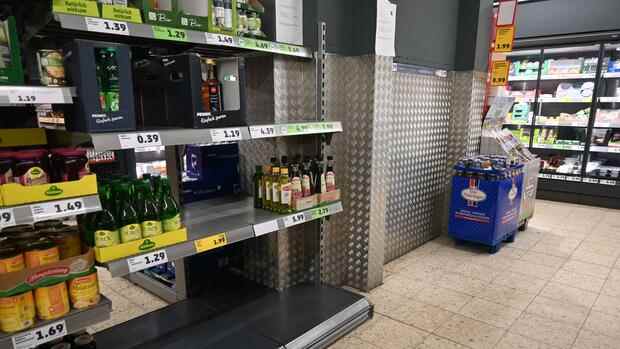Consumers are currently hoarding storable goods in the expectation that the war in Ukraine will push prices up even further. Because the production of food has become more expensive for months due to high energy and raw material prices everywhere. The Food and Agriculture Organization (FAO) expects global food and feed prices to rise by between eight and 20 percent.
The wave of inflation is now hitting retailers and consumers. The discounter Aldi is increasing the prices for almost a tenth of its range this week, the “Lebensmittelzeitung” reported on Thursday, more than it has been for years. Lidl has already followed suit. In this country, Aldi is considered the pacesetter when it comes to prices.
The Smhaggle price comparison evaluated selected product groups and their shelf prices for the Handelsblatt. The following products are currently in particularly high demand – and have become significantly more expensive compared to the previous year:
Top jobs of the day
Find the best jobs now and
be notified by email.
sunflower oil
The oil is already sold out in many supermarkets. Prices have already risen sharply compared to the previous year. Edeka’s own brand Gut & Billig now costs 1.79 euros in a liter bottle, 40 cents more than at the beginning of 2021. That is an increase of 28.8 percent, which is exactly the same as for the prices for private labels from Rewe (Ja!) and Aldi (Bellasan) rose. Branded products such as Thomy increased in price somewhat less at 21.8 percent.
According to Smhaggle, potato chips from Funny Fresh, for example, or crunchips fried with sunflower oil are no longer available in many places. “Sunflower oil could soon become scarce in Germany because of the Ukraine war,” says the Association of the Oilseed Processing Industry in Germany (Ovid). “The supplies will probably last for a few weeks.”
Germany covers 94 percent of its needs with imports. 51 percent of global oil exports come from Ukraine. Due to crop failures in Canada and corona-related logistics problems, the supply was strained anyway. However, the association emphasizes that consumers could easily switch to other oils such as rapeseed oil.
flour and baked goods
Wheat flour is sold out in many markets. The price of Aurora Wheat Flour 405 rose by 20 cents to 1.19 euros, an increase of 20.2 percent. The price of Aldi flour Mühlengold went up just as much. On Monday, Moscow imposed an export ban on grain until the end of June. Almost 30 percent of all wheat exports come from Russia and Ukraine.
“The export ban initially has no direct effects because we in Germany have a degree of self-sufficiency in grain of over 100 percent in some cases,” says the Central Association of the German Bakery Trade. Nevertheless, he expects the prices for baked goods to rise – above all because of the high energy costs for the ovens. Because flour, and therefore wheat, only accounts for five to ten percent of the production costs of a roll.
Toilet paper
As at the beginning of the pandemic, Germans are hoarding toilet paper again. “Toilet paper in the low price segment is currently often out of stock,” says Sven Reuter, CEO of Smhaggle’s parent company, Great Value Group Customer Solutions. Market leader Essity (Zewa, Tempo) had again announced price increases at the end of January.
The industry reports that double-digit surcharges are again necessary. The reason for this is the skyrocketing cost of energy and pulp. Production is very energy-intensive, and paper mills in Italy are already at a standstill. Recently, prices had risen only moderately.
Own brands were 3.5 percent more expensive, the branded product Zewa Bebest eight rolls in three layers costs 3.29 euros, ten percent more than a year ago. “Toilet paper should actually cost five euros a pack instead of three,” says consumer goods expert Stephan Kunigk from Kerkhoff Consulting.
pasta
Although pasta is currently not sold out, it has become the most expensive in comparison to the previous year. The spaghetti from Aldi (Cucina), Lidl (Combino), Penny and Netto now cost 0.69 euros, a full 40.8 percent more. The reason is not the Ukraine war, but bad harvests of durum wheat. Canada, one of the most important export countries, suffered from long periods of drought and heat in 2021. The harvest was the worst it had been in 14 years. “We see massive supply bottlenecks,” warns Peter Haarbeck from the Association of Grain, Milling and Starch Industries.
Sven Reuter from Smhaggle also advises buying private labels in view of current developments. “These are on average 45 percent cheaper than the comparable branded product.”
More: Why prices in supermarkets continue to rise

